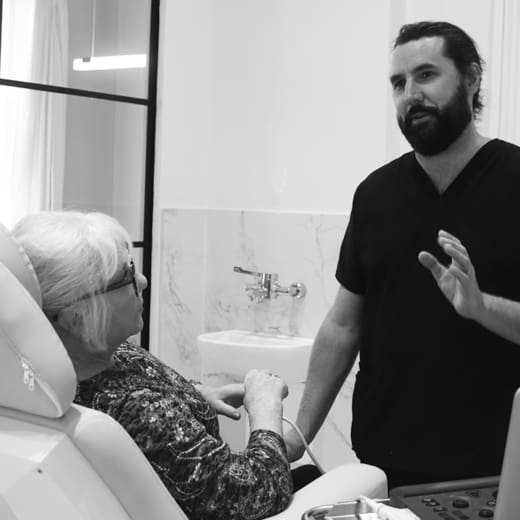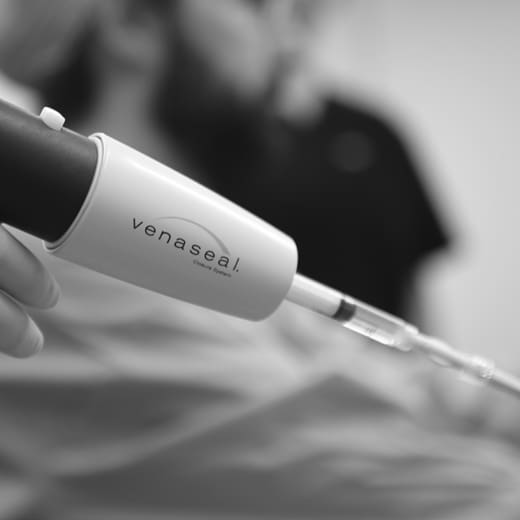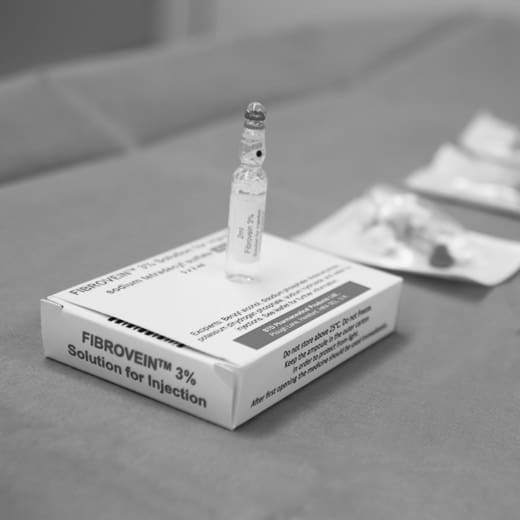McKeown Medical
167 Bath Street, Glasgow, G2 4SQ
Dr Alex Vesey is our expert consultant vascular surgeon who heads up our varicose vein team at McKeown Medical. Here, he discusses whether varicose veins can go away on their own.
Date posted — 17.08.24
Varicose veins typically do not go away on their own. Once they develop, they are usually permanent unless treated. Lifestyle changes, such as regular exercise, weight management, and elevating the legs, can help manage symptoms and prevent them from worsening but won’t eliminate existing varicose veins. If you have problematic veins that you want to get rid of then you will likely need treatment such as VenaSeal™, Radiofrequency ablation, foam sclerotherapy or surgery.
We offer a range of treatment options for varicose veins including VenaSeal™ – the most up to date method of treating varicose veins that causes less pain and allows you to get back to normal almost immediately, without the hassle of wearing bandages or compression stockings.
Get in touch with our friendly team and we’ll help you find the right varicose vein treatment for you.

Varicose veins are enlarged, twisted veins that often appear just under the skin, primarily in the legs and feet.

When it comes to treating varicose veins, VenaSeal™ has emerged as a revolutionary option that offers a minimally invasive and...

Foam sclerotherapy is an advanced form of sclerotherapy used to treat larger varicose veins, particularly those that may not respond...
1 / 3
2 / 3
3 / 3

Varicose veins are enlarged, twisted veins that often appear just under the skin, primarily in the legs and feet.

When it comes to treating varicose veins, VenaSeal™ has emerged as a revolutionary option that offers a minimally invasive and...

Foam sclerotherapy is an advanced form of sclerotherapy used to treat larger varicose veins, particularly those that may not respond...
Introducing CoolSculpting® Elite!
We’re delighted to announce that we now have the CoolSculpting® Elite, modelled here by our lovely nurse Niki! We’re excited to be the first clinic in Scotland to take delivery of the latest technology from CoolSculpting®, which has new and improved applicators to improve the contact between the machine and the skin, for even better results than before.
Now is the perfect time to have this treatment in time for the summer. To find out more about CoolSculpting® check the link in our bio.

We announced our hair transplant clinic with Dr Mani last week and we`ve been overwhelmed with bookings! We have one space left for this month`s consultation day on the 4th April so if you, or someone you know, would like to book in drop us a message or email [email protected].
Dr Mani is based in London and has a reputation for outstanding hairline restoration and will be joining us once a month to bring his expertise to our clinic.
If you`d like to know more about the procedure, you can read more at the link in our bio.

As everyone knows, the lack of protections in Scotland for patients having cosmetic procedures is something I have campaigned on for years.
It’s an issue that I feel very passionately about and will not stop campaigning on until we have meaningful change from our government. I have written to the government many times over the years and during the recent consultation I wrote to the minister for public health, Jenni Minto, on behalf of 20 of the most experienced doctors in aesthetic practice from all across Scotland explaining why - in very clear scientific terms - she has got it wrong with her current proposals to allow beauty therapists to continue injecting medicines and administering medical devices.
We have asked Jenni Minto to meet with us, to hear our perspective, but she continues to refuse to sit down and talk to us. In tonight’s STV news Donna has been exceptionally brave to speak on camera about the harm she has suffered as a result of a beautician, and the NHS care she has required, but sadly she is not alone.
There are so many Donnas who have been harmed in Scotland and we hear about it every day in our clinics across the country although the majority are too scared or embarrassed to speak out publicly and the government don’t want to listen to the professionals.
Whilst people like Donna continue to be harmed by the diabolical lack of regulation in Scotland, I will not stop campaigning. The government needs to act now to make injectable toxins and dermal fillers medic-only, bringing us in line with every other country in Europe, every state in America and every state in Australia.
Why don’t our government believe people in Scotland deserve the same protections as all of these other countries?

We have another exciting new launch in the clinic - and this one is for the men, or husbands, brothers AND sons!
We are bringing back hair transplant to the practice, performed by Dr Manish Mittal. Dr Mani is based in London - where he has a reputation for outstanding hairline restoration - and will be bringing his expertise to Glasgow every month in our clinic.
These are some examples of Dr Mani’s work. As you can see, he is not only great at creating natural looking hairlines - but also achieving full looking density, which is a rare skill in hair transplant and one of the key reasons we selected him to be our hair transplant partner.
If you (or someone you know!) would like to come in for a consultation and meet Dr Mani, send us a message, email us at [email protected] or call the clinic on 0141 370 0509.

In case you missed it, here’s Dr Rhona & Dr Iain’s live Q&A on all things perimenopause, menopause and HRT. Thanks to everyone who joined and asked questions. We’ll be doing more of these so keep an eye out for the next one!
And if you’d like to know more about our menopause services, check out the link in our bio!

We`re going live tonight at 7pm! Join Dr Rhona and Dr Iain (@driainmartin) this evening on Instagram live, where they`ll be discussing everything about perimenopause & menopause, including: �
Symptoms & early signs
Treatment options, including HRT
Myths vs facts - getting the right information
They`ll also be answering your questions live, so if there`s anything you`d like to ask, leave a comment, send us a message or head to our stories.
We hope you can join us!

Crepey skin under the eyes is one of the most common complaints we hear of in the clinic.
The best way to treat it is using laser resurfacing. This is one of our patients just one week out from treatment. He healed exceptionally fast (most people still have a bit of redness at this stage) and is already looking great.
What do you think?

The nose can be one of the most challenging parts of the face to get right.
This lovely patient had a previous rhinoplasty, but she felt it was over done, making it too short and upturned. I used some filler to restore some height to the bridge of the nose as well as lengthen and de-rotate the tip.
She is over the moon with the result, which looks much more natural than the previous surgery. What do you think?

Happy International Women’s Day! Today, our incredible women’s health team are in the Herald talking about access to women’s health services in Scotland. You can read the full article at the link in our bio.
We carried out a survey of our patients and were blown away by the response - almost 1200 of you replied, and the message was very clear. Women don’t feel their health problems are taken seriously by the medical establishment and they are tired of being fobbed off. The Scottish Government introduced a plan to overhaul women’s health services from 2021 - 2024. Yet here we are in 2025 and our survey is saying that nothing has changed.
We’re calling on the government to go further and faster! What’s your view?
